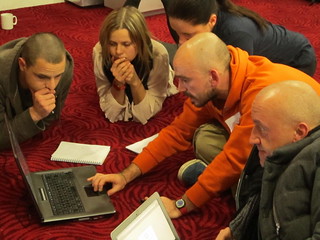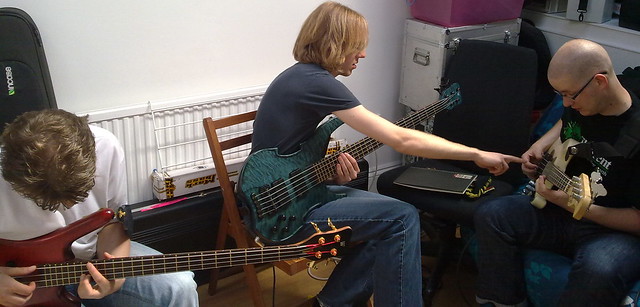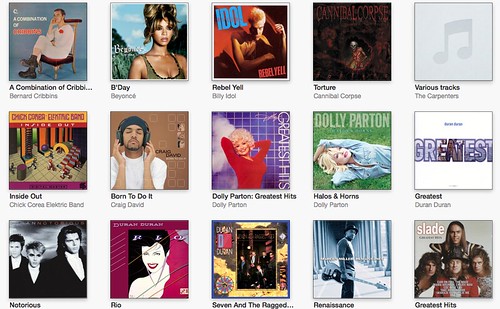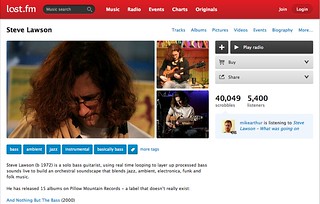 An awful lot of music courses these days have group-based practical projects as at least one module within the course. This is, I think, a positive trend, in that it encourages you situate your learning within the context of your own practice as creative professionals, but it definitely requires some thought regarding how to organise yourselves in a group. So here are a few thoughts on how to do that:
An awful lot of music courses these days have group-based practical projects as at least one module within the course. This is, I think, a positive trend, in that it encourages you situate your learning within the context of your own practice as creative professionals, but it definitely requires some thought regarding how to organise yourselves in a group. So here are a few thoughts on how to do that:
- Firstly, you need to decide on a shared communication method – it could be email, a Facebook group chat (or group), Whatsapp group, Skype chat, Google Hangout… You’ll need both ongoing text chat and probably the option to have audio or video meetings, depending on how often you’re able to meet face to face. So, decide on this straight away, and make sure it’s one that everyone can access.
- Secondly, you’ll need some kind of shared calendar into which you can put tasks and deadlines and assign roles. Google Calendar is as good as any for this, and is pretty widely supported on the web and via phone apps. It may be that your college or university has the option to create shared events via their web services, which is fine too. There are also a LOAD of great task-sharing apps – Wunderlist, Trello, etc… Some are paid, some are free. Do some research (assign someone the task) and settle on what you’re going to use within the first 24 hours of forming the group. Make a rule that you all check the calendar for that days tasks every day.
- Along side this, you’ll need a space where you can all share documents, resources etc. Google Docs/Drive is good for this, and I think Microsoft Office 365 also has this option. Dropbox is great if everyone has an account. Google Docs makes it possible to collaborate on the same document in real time. That can be really handy if one of you is, for example, writing a press release, and someone else is proof reading it.
- Establish a set of guidelines straight away that everyone agrees to regarding what you do when someone misses a deadline. Get it down in a document before you start so that you can deal with people who are unreliable without it having to get personal. If someone is missing deadlines as assigned in the calendar, have a protocol for reassigning that work, and for finding out what on earth is going on.
- Set regular times to check in and report back on what you’ve done. If it’s a big project, you can do this at the end of every day – start the day with the to-do list, end it logging the tasks that have been accomplished. If you’ve got a little more time to work on it, you might decide you only need to do this every other day, or three times a week… But make sure it’s regular so you can keep a track of jobs that are missed. If it’s part of a 10 week module, you REALLY can’t afford to be waiting a week to find out that a whole load of the work that you’re all relying on has been missed.
Keep your tutor in the loop. Make sure that each week you report back on what’s going on, where you’re up to and what you need help with. If they’re available for tutorials, book time with them. If they aren’t, but they are available via email, check that it’s OK, then contact them.
- Find out where the other staff are in your institution that may be able to help you. Get all the support you can, and then apply your initiative and learning to get on with it.
- Document EVERYTHING. Keep accurate notes of what you’re up to, and what you need to do, make sure that meetings are minuted (one person keeping a log of everything that is discussed and decided), use the camera on your phone to take pictures and video of all the stuff you get up to – sharing the story of your project can help make it interesting for your potential audience, so use the story of the project to support the project!
- Sort out your own plan for time management – if you are prone to wasting endless hours online, or gaming, or watching TV or whatever, commit to finishing the tasks on your list daily before you reward yourself with your leisure pursuit of choice. Don’t let the group down because you’re too undisciplined to put the PS4 away for a few hours…
Project work can be an amazing chance to try things out, learn from your peers, and get valuable experience in your chosen field, as well as to develop skills you didn’t even know you might need. Enter into the task with enthusiasm and an open mind, get the work done, and enjoy it – it could end up helping you decide what you really want to do with your life!





